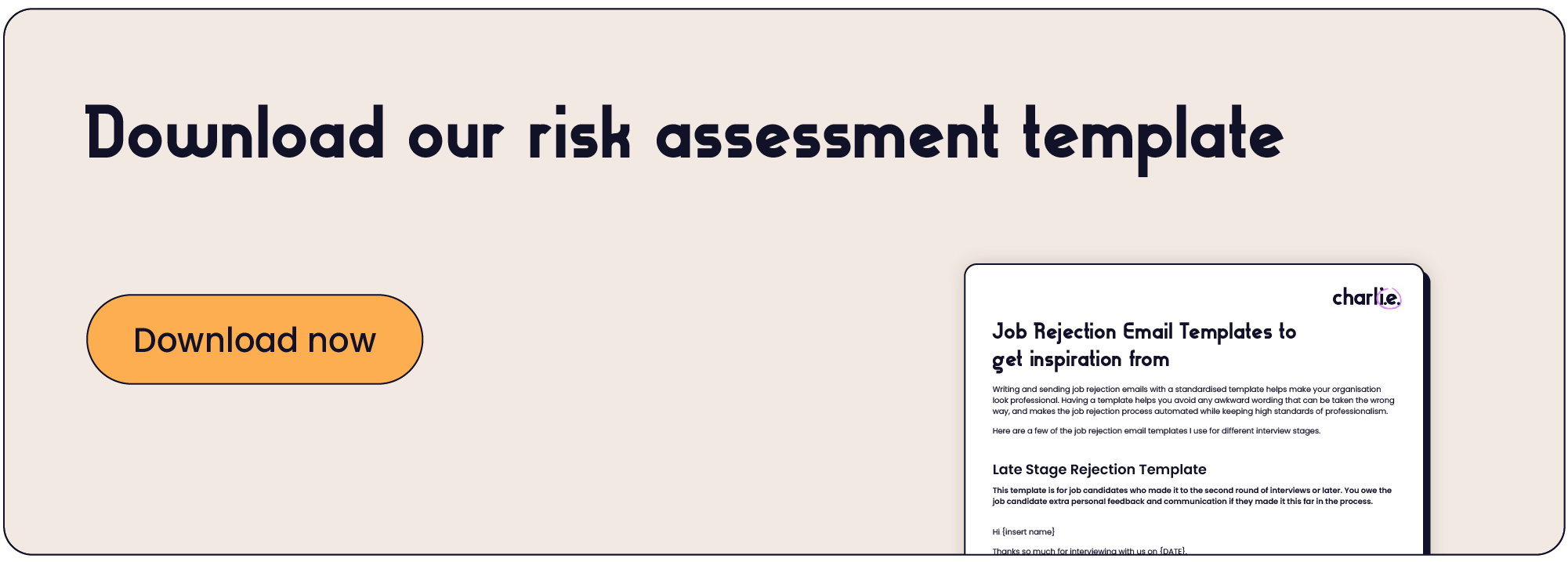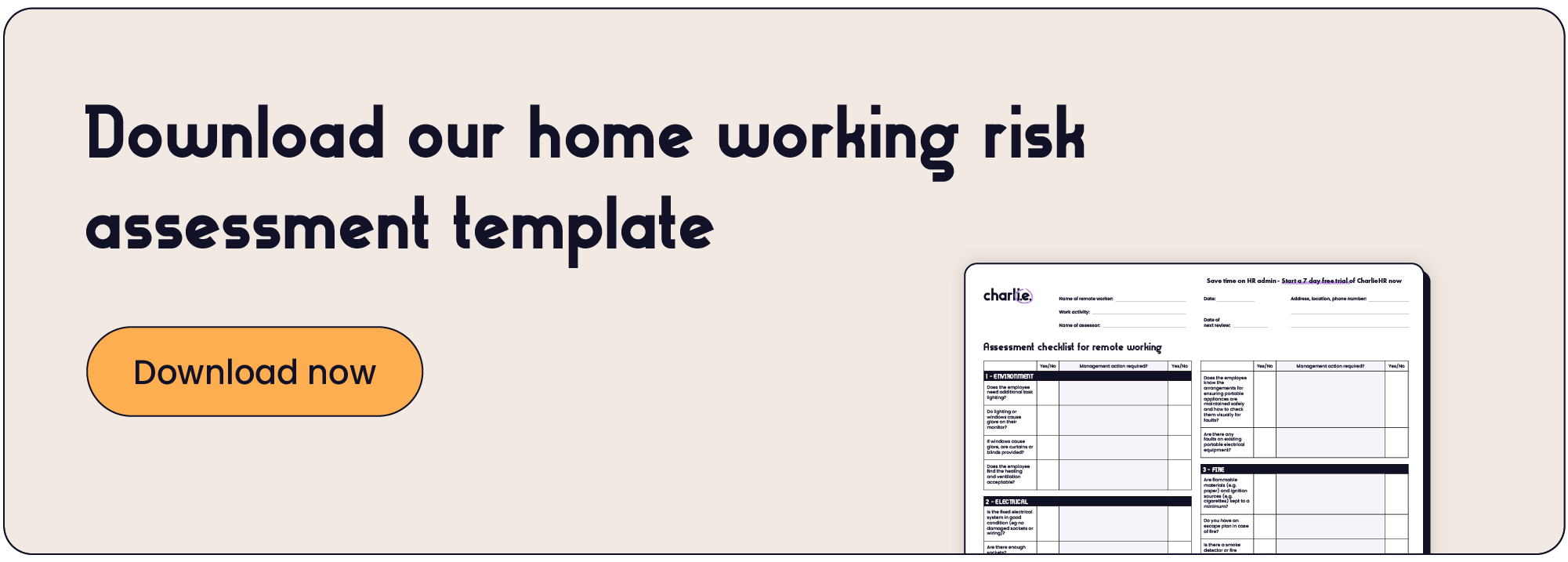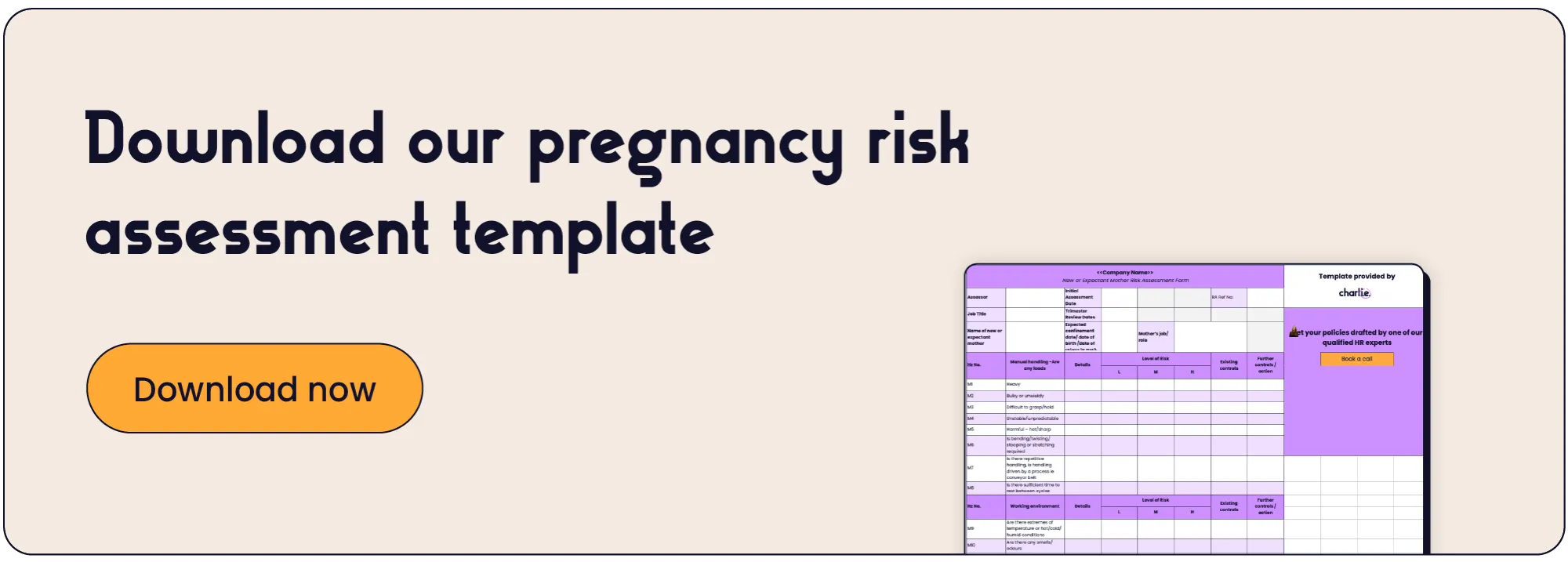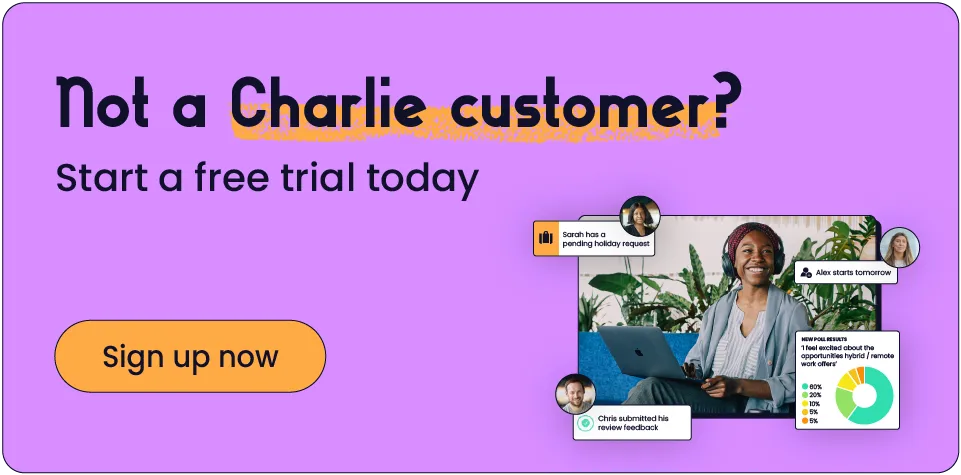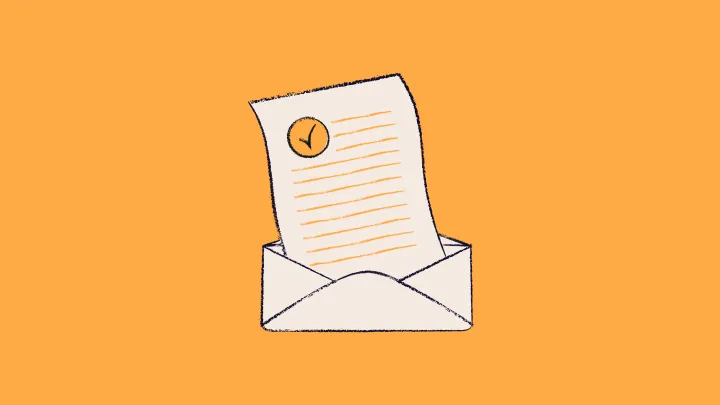Your complete guide to risk assessments — with 3 free templates

Solid foundations are essential when starting or growing a small business, but as you’re building them you’ll be faced with all sorts of challenges that make you question your decisions, instincts, or knowledge.
This guide will help you understand what you need and why, but without the daunting — and often confusing — legal jargon.
We'll be looking at risk assessments, which are something we advise small businesses about all the time at Charlie. Keep reading if you want to know why you need a risk assessment at work, or are unclear on how to write a risk assessment, or are just looking for an easy-to-adapt risk assessment template.
As one of Charlie’s CIPD-qualified advisors, I also specialise in getting new businesses off to a good start by making sure they comply with HR law requirements and understand why risk assessment is important. So I recognise that you might feel worried that you don’t understand all the legal requirements well enough, and could accidentally make mistakes that will cause legal trouble for your company.
This is especially relevant for small businesses, where the person responsible for HR can be either the CEO (who’s incredibly busy), or a junior member of the team (who’s understandably inexperienced), and where seeking advice from a lawyer is just too expensive.
We’ll break down the jargon so that you can easily apply it to the real-life scenarios you face every day, and understand where and how you’d put risk assessments in place.
What is a risk assessment?
A risk assessment is the process of identifying hazards that exist or can occur in the workplace, and how they could cause harm — and then looking at what you can do to minimise that harm or reduce the risk.
For the purposes of this guide, we’ll focus on what’s required for a risk assessment for office-working teams and a home-working risk assessment for remote or hybrid working employees.
Why is it important to do risk assessments?
As an employer, you're required by law to protect your employees, and anyone else who comes into contact with you (customers, suppliers, contractors etc.) from harm or potential harm.
The minimum you must do is:
- Identify what could cause injury or illness in your business (hazards)
- Decide how likely it is that someone could be harmed and how seriously (the risk)
- Take action to eliminate the hazard, or if this isn't possible, control the risk
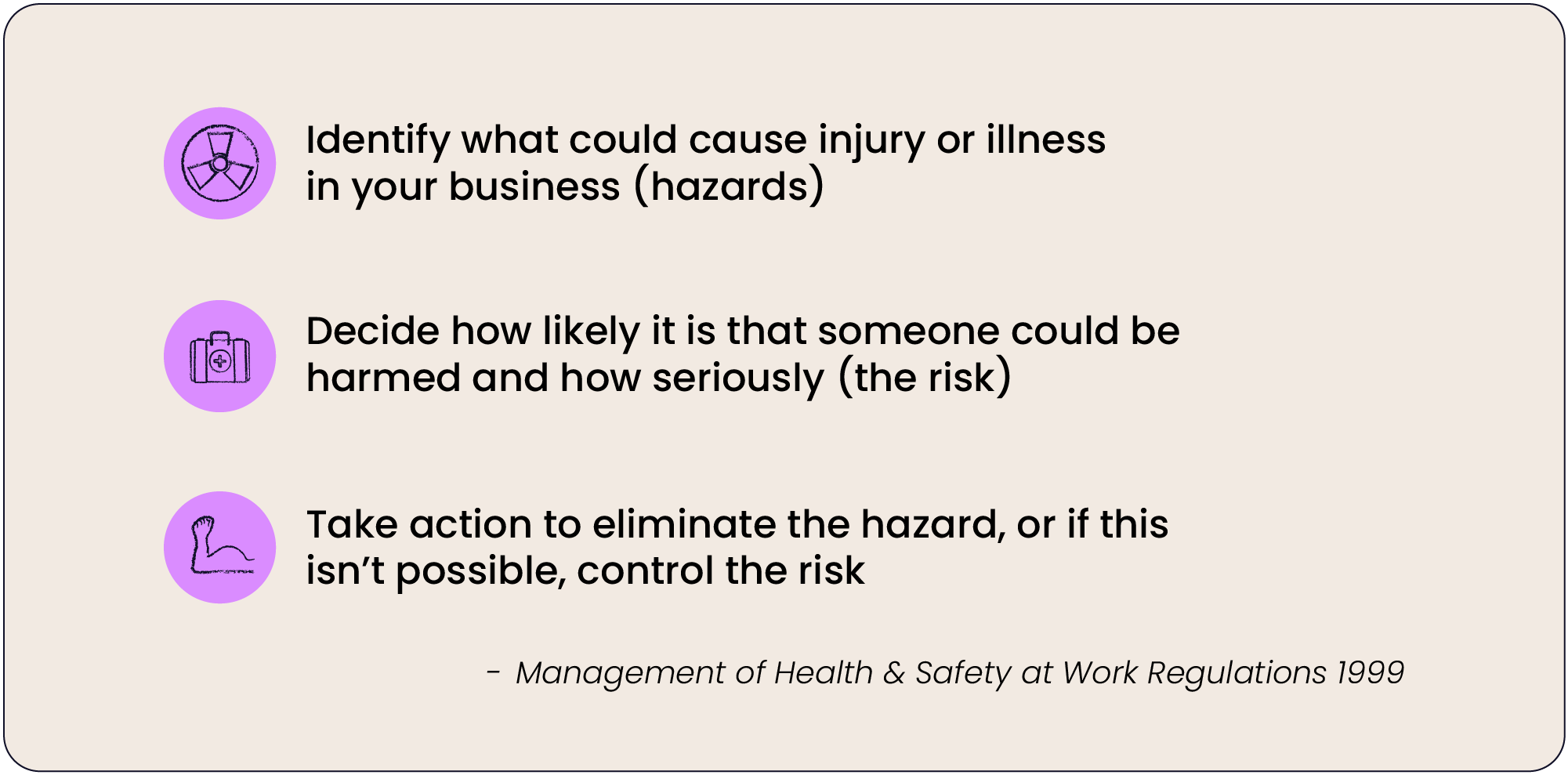
Risk assessments help you create and maintain a safer and healthier place to work and avoid having to write a workplace accident report.
It is a very proactive approach, so you also need to ensure that you have undertaken a working-from-home risk assessment to cover your remote or hybrid-working teams. Your approach to home working should be balanced, so although you’re unlikely to need to visit individual team members’ homes, you do need to make sure they have healthy and safe environments to work from.
A risk assessment must be completed if there is ‘reasonably foreseeable and significant risk’, and if your business has five or more staff it must be written down.
For example, a risk assessment for working from an office should include hazards like:
- Slips, trips and falls (wet floors, stairs, loose carpet, tripping over wires etc.)
- Eye strain from looking at computer screens for too long
- Fire hazards
- Ergonomic injuries caused by sitting poorly/badly set up workstations
Conducting a risk assessment: a step-by-step guide
The exact tests and analyses you’ll make in a risk assessment will depend on the type of assessment and what you’re looking for. Overall they’ll have the same basic structure.
Step 1: Identify hazards
Take a stroll around your workplace and make a note of any potential hazards that might be about. Look for anything that can cause harm, like loose cables, high noise levels, or slippery surfaces.
Step 2: Evaluate and prioritise risks
Once you know what the hazards are, sort them out in order of the potential risks they pose. Consider how likely it is that each hazard can cause harm, and how bad it would be if it did. Sort out the hazards with the highest risk first.
Step 3: Implement mitigation strategies
This is the step where you take action. Carry on with the steps you decided on before eliminating or reducing the risks. If eliminating the risk isn’t possible, consider ways to replace it with a less hazardous option.
Put in place any modifications or equipment to protect against exposure to the hazards. Also, consider rotating employees through high-risk tasks.
Step 4: Documentation and record-keeping
Document your actions taken as you go along. Documenting risk assessments is mandatory under UK law, but it also provides a baseline to refer to in future inspections.
Step 5: Review and update
Risk prevention is an ongoing task. Schedule reviews annually, or more frequently if you make lots of changes to your business operations. Revisit your risk assessment to make sure it addresses the risks adequately.
What are the different types of risk assessment?
You’ll need the following types of risk assessment for your small business:
Fire risk assessment
A fire risk assessment is a review of your premises and the people who use them from the perspective of fire prevention. In a fire risk assessment, you assess all potential risks and make recommendations to improve fire safety precautions to keep people safe.
Home working risk assessment
A home working risk assessment assesses the hazards relating to any work activities carried out in an employee’s home, and whether appropriate measures have been put in place to minimise risks and prevent harm. It covers the general working environment (including fire and electrical) as well as specifics relating to their daily job, like how their workstation is set up.
Mental health risk assessment
Also known as stress risk assessments or mental wellbeing at work risk assessments, mental health risk assessments identify the stress risk factors at a business that could negatively impact your employees’ mental health.
All employers have a legal duty to protect their employees from stress in the workplace, and mental health risk assessments are typically put together by line managers who have operational responsibility for members of the team.
Pregnancy risk assessment
Pregnancy risk assessments need to be done as soon as an employee tells you they’re pregnant through a maternity leave letter. It should include checking for things like:
- Is there any new risk in the work they carry out?
- Are they comfortable in their working environment?
- Is there anything you can do to support them more? (buying a back support for their office chair, for example)
In a pregnancy risk assessment, you would offer to support a team member with any reasonable adjustments required for doing their job safely, like taking regular breaks.
Risk assessment template
As a small business owner, you may not necessarily have risk assessment procedures in place, or perhaps you do but they may be outdated.
No shame in that. Risk assessments are challenging for any small business. Having a risk assessment template makes the process much easier and enables you to do more with less.
Consider using the risk assessment template I made for you below as a starting point.
Company Details
- Company Name: [Company Name]
- Assessment Date: [Date]
- Assessment Conducted By: [Assessor’s Name]
- Review Date: [Scheduled Review Date]
Risk Assessment Overview
- Location/Department Assessed: [Location/Department]
- Activity/Process: [Description of the Activity or Process Being Assessed]
Step 1: Identify hazards
- Hazard Type: (e.g., Physical, Chemical, Biological, Ergonomic, Psychosocial)
- Description of Hazard: [Describe the hazard identified]
- Location of Hazard: [Specify where the hazard is located]
Step 2: Decide who might be harmed and how
- Individuals at Risk: (e.g., Employees, Contractors, Visitors, Public)
- How They Might Be Harmed: [Describe how the individuals might be harmed by the hazard]
Step 3: Evaluate the risks and decide on precautions
- Risk Level (e.g., Low, Medium, High):
- Existing Controls: [List any existing controls or measures already in place]
- Further Action Required: [Detail any additional actions needed to mitigate the risk]
- Action By Whom: [Name/Role of the person responsible for implementing the action]
- Action By When: [Deadline for completing the action]
Step 4: Record your findings and implement them
- Summary of Findings: [Provide a brief overview of the significant findings and actions to be taken]
- Implementation Plan: [Outline the plan for implementing the necessary risk control measures]
Step 5: Review and update
- Review Findings: [Notes on the review process and any changes made to the assessment]
- Changes to Assessment: [Detail any changes or updates made to the original risk assessment]
If you're looking for a place to have all your risk assessment templates in one place, we'd also advise you to have a look at investing in HR software. With Charlie, for example, you get all of your templates on hand and ready to use.
